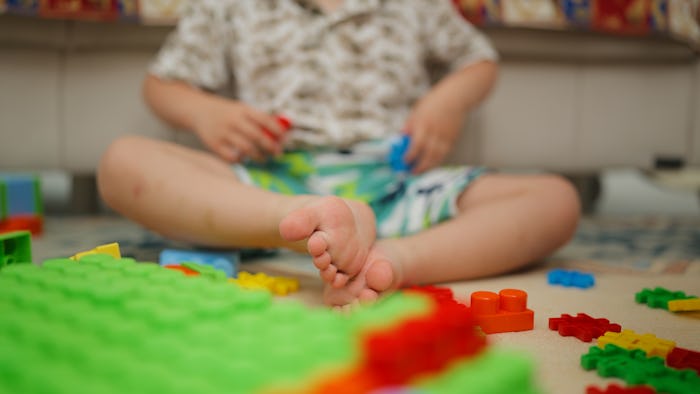Viral

Mom On TikTok Sparks Heated Debate Because She Doesn't “Play” With Her Kids
“Eventually they stopped asking and just went off and played.”
Even though there are innumerable ways to raise happy, healthy children, parents often second-guess themselves, and wonder whether they’re doing things “right.” Often, we look to each other for advice, hoping that something that’s worked well for one parent will be helpful in our own families. So when one mom on TikTok talked about how her children let her sleep in on weekends because they’ve learned to play independently, others wanted to know “how did you do this magic?” Her answer, on the other hand, has caused some pretty vigorous debate in the comments and across social media.
“The reason that I have children who are 4 and 6 that let me sleep in on a Saturday because they’ll just go play ... is because I just said no to them every single time they asked me to play with them. For years. And eventually they stopped asking and just went off and played,” KC Davis, who goes by @domesticblisters on TikTok, said in a viral video posted on March 10.
Davis continued that she understood that people may find that jarring or callous, but urged viewers to “hear what I’m saying, not what I’m not.” She clarified that she didn’t ignore or not engage with her children; she just established early on that “adults do not play with toys; adults do not pretend play.”
Davis then went on to list all the things she did do with her children: bake, make art, do science experiments, go for walks. But imaginative play? Nope. And not in a mean way; just a “no thank you, sweetheart” will do. That’s how she gets time to sit in bed with a book while they go off and play “like kids.”
“But nobody tells you that the way that you get there is by saying no — a lot. And they’re sad about it and they’re mad about ‘Please mommy, please, play with me’ and you feel like you’re the worst parent in the world for saying no to them and hurting their feelings, but I can tell you, fast-forward a couple of years: they are happy and creative and they have parents that are loving and responsive and they are secure enough to just go play and be kids.”
The comments section that ensued was, predictably, chaotic.
“I had a mom who didn’t play,” reads one of the top comments. “She spent time w us ONLY in ways she enjoyed or found relevant as you mention here. We don’t talk now that I’m an adult.”
“Saying ‘they eventually stopped asking…’ like it was a positive thing is WILD,” says another.
“This is absolutely heartbreaking,” commented a third. “Some people are not meant to be parents.”
But not everyone was displeased.
“I told my mom I don’t play with my son like that and she acted horrified like she didn’t send us outside at 9am and told us to come back when the street lights came on,” replied one TikTok user. (This was, incidentally, the most liked response in the comments section by far.)
“This made me raise an eyebrow at first but I listened and actually this is... so smart,” mused another.
“My mom very rarely played pretend with me. Just not her jam,” said one user. “But man, did we spend so much quality time together. She’s still my best friend!”
And this very much mirrors Davis’ experience, as she explained in one of several follow-up videos.
“I’m just doing what my mom did, OK? I don’t have a single memory of my mom playing pretend with me or playing with toys with me, but she is my best friend to this day,” she said, and continued later, “I’m fairly confident I’m not f*cking my kids up because all the people that talk about how awful and traumatic it was for their parents to not play with them always have this weird post-script at the end like ‘Well, they also beat me,’ something else horrible. ‘She also ignored me all day.’ I had experience of a parent that was very engaged and it was not traumatic that she did not play pretend.”
Indeed, while the American Academy of Pediatrics (AAP) highlights the vital importance of creative/imaginative play in children — either through make-believe or toys — it doesn’t suggest parents need to be involved for children to reap the cognitive and emotional benefits. Sure, playing Barbies with your kiddo or pretending to be Princess Leia to your child’s Obi-Wan Kenobi is a great way to bond, but it’s also not the only thing you can do to engage with your kids. Conversely, plenty of children who are used to playing make-believe with their parents will also go on to play independently around the ages of Davis’ kids and let you sleep in or read a book (case study: me and my kids).
It’s almost like there’s more than one way to do this whole parenting thing.